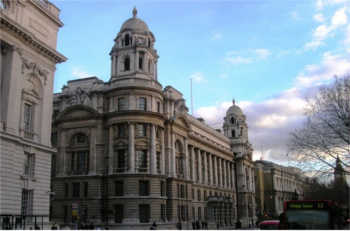Top economists have called for a range of radical new financing powers to be handed to transport authorities and future metro mayors.
A new report from leading economic think tank IPPR North, Connecting Lines, outlines three potential phases in expanding financial and governance powers up to 2024.

Will Whitehall (pictured) embrace the new world?
IPPR North suggests government should establish ‘a single transport fund as part of a longer-term financial settlement with transport authorities’, with funding arranged on a non-competitive basis ‘according to population, patronage, economic growth potential and deprivation levels’.
Transport authorities and mayors should eventually be able to pilot and roll out a range of new levies, some of which mayors could create themselves.
Metro mayors should also be able to implement the workplace parking levy without secretary of state approval.
Total transport service integration should ‘be rolled out as far as possible’ – based on the promising trials that are already underway.
In the short-term, IPPR North suggests ministers should ‘proceed with plans to enable mayoral combined authorities to levy 2p on business rates to be directed toward transport infrastructure' [the infrastructure levy] before widening this out dramatically.
In later stages government should then remove the 2p cap and ‘broaden the scope of the levy to allow it to fund services and other improvements in the transport network’.
Government should also address issues surrounding the competitive bidding processes local authorities go through to win extra cash from various funding streams, as these ‘do not allow long-term strategies to be implemented effectively’, the think tank states.
‘While these different streams of funding may need to remain separate during this early phase, they should all be distributed at around the same time period. This would allow transport authorities to plan for a ‘bidding stage’ and an ‘implementation stage’, and therefore to bring together where possible the different funding streams that they receive’ the report states.
‘A small proportion of each pot should be top-sliced and used to reward authorities that demonstrate integration, where appropriate, between these discrete streams.’
In terms of 2017, when the first elections are due, metro mayors should target a maximum 60-minute commute for their residents as a key pledge, IPPR North states.
The economists highlight that in Greater Manchester it takes more than two hours to travel by bus from the centre of Bolton, Rochdale or Bury to Manchester airport – where a large number of jobs are set to be created.
It also takes nearly 90 minutes to travel between Middlesbrough and Newcastle - IPPR North states this is ‘a distance no further than between Reading or Guildford and central London, which takes just 57 minutes’.
Metro Mayors with London-style transport powers will be created in major cities and city regions from 2017, including:
- Greater Manchester
- Liverpool City Region
- The North East of England
- Sheffield
- The Tees Valley
- the West Midlands.
The draft ‘North Midlands’ deal also includes provision for an elected mayor.